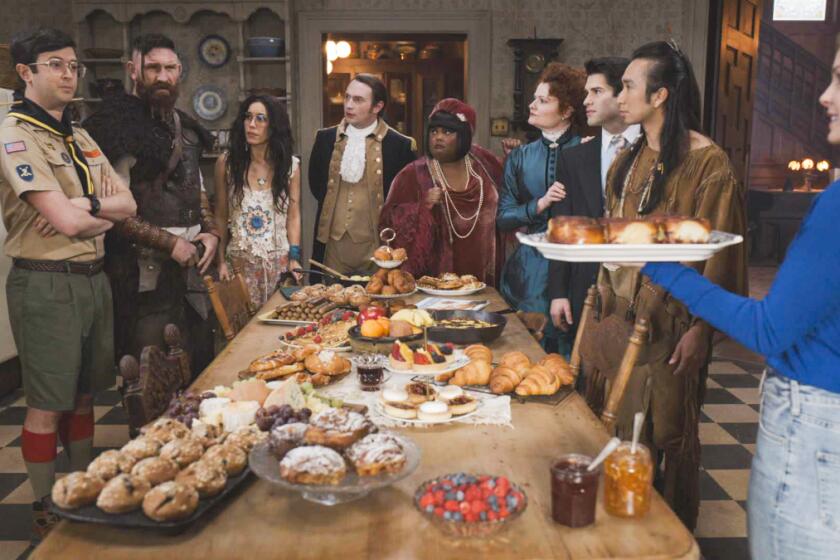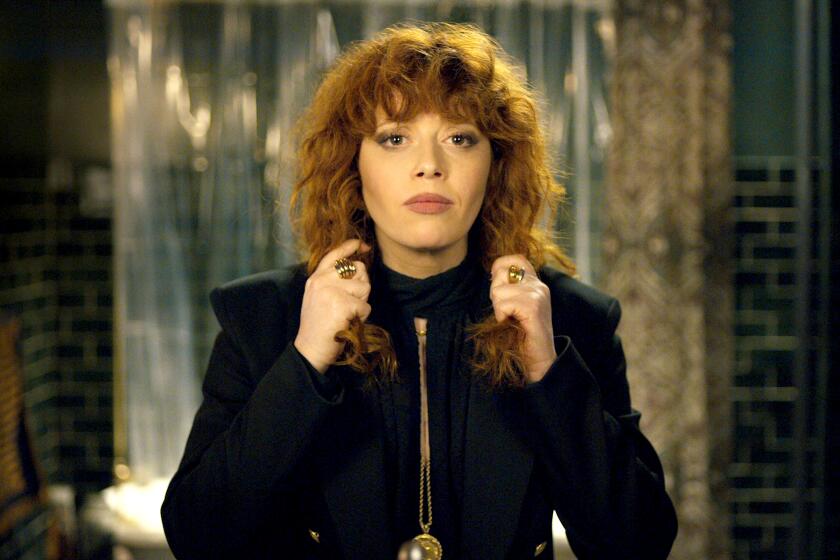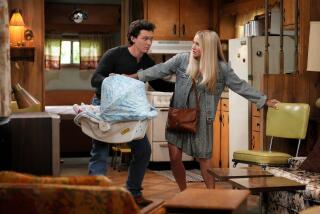‘Night Court’ and ‘That ’90s Show’ welcome back the age of pre-prestige TV
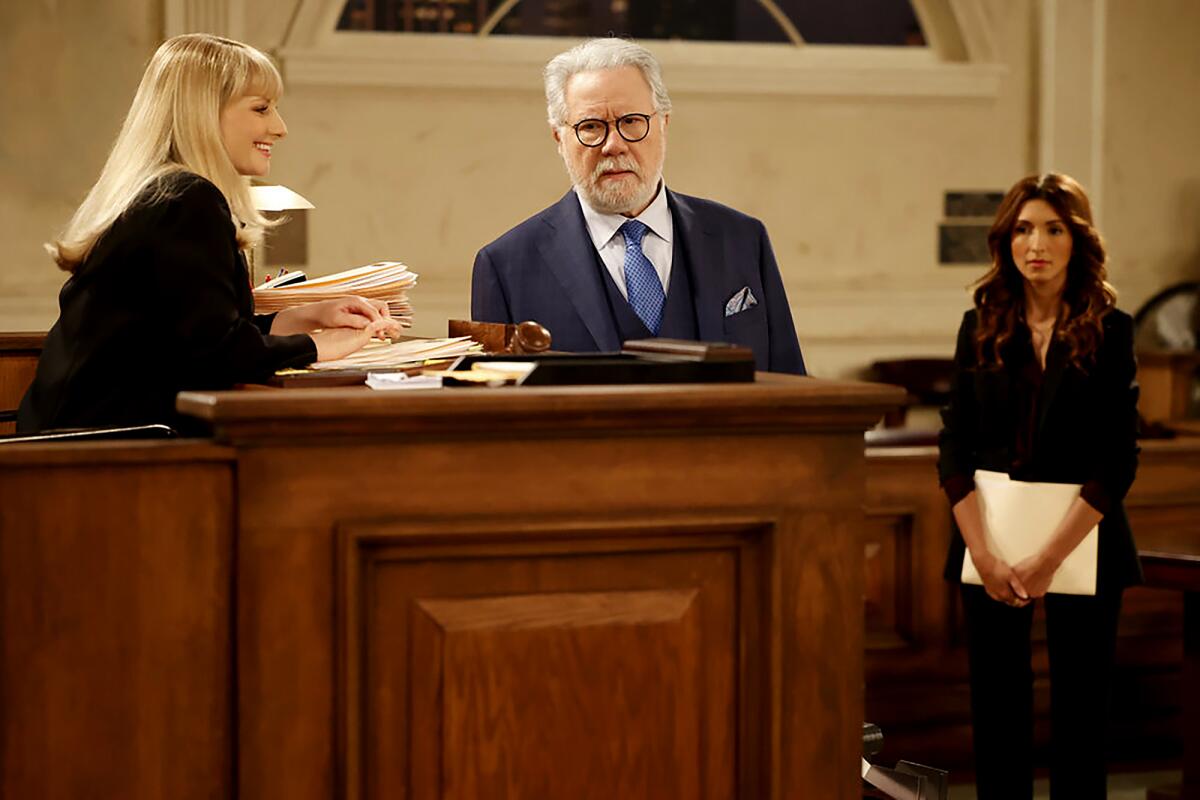
- Share via
It’s impossible to generalize about television except to say that there’s too much of it, but here and there, in a small way, we seem to be experiencing something of a neoclassical phase. Reheating old series and seasoning them to modern tastes — often to make them darker, more psychologically acute or self-satirical — has been common practice for a while. But there is also a move to mimic and honor the forms and ambitions of pre-prestige television, made less to impress or elevate than to entertain. A show like the recent CBS series “So Help Me Todd,” with Marcia Gay Harden as an attorney and Skylar Astin as her investigator son, could easily have been been mounted in the 1960s or ’70s; the upcoming “Poker Face,” with Natasha Lyonne, though identifiably of its time, takes structural cues from “Columbo” and “The Fugitive.”
This week sees the revival of two popular comedies born in late 20th century broadcast television. “Night Court,” which ran from 1984 to 1992, returned Tuesday, again on NBC; Fox’s “That ’90s Show,” a sequel to “That ’70s Show,” which aired on Fox from 1998 to 2006, premieres Thursday on Netflix. Each features at least one old cast member; each re-creates the old sets; each is, as before, a multi-camera comedy; and neither is out to do more than capture whatever it was that made their progenitors so popular, to not fix what wasn’t broken. Whether this will work on a contemporary audience, whoever that might be — older generations looking for a hit of the past, and/or younger ones ready for something new that’s something old — is a separate question. Time will tell.
The original “Night Court” starred magician-comic Harry Anderson as Harry Stone, a young, irreverent judge working the night shift in Manhattan’s Municipal Court. In the new show, the late actor’s bench and gavel are newly taken over by Melissa Rauch, who also developed the revival, as Stone’s daughter Abby, a chirpy, chatty product of the upstate small town to which her father moved sometime after the first series ended. Having left behind “my friends, my fiancé, my cow,” she’s a “woman who apologizes to her gavel when she bangs it too hard”: something of a Pollyanna, an effect amplified by her Hayley Mills bangs, but a puckish one (a portrait of a German shepherd in judge’s robes adorns her chambers). And she is no dope.
The It Takes a Village comedy is one of broadcast television’s most reliable forms. And we may need its comforts now more than ever.
As former assistant Dist. Atty. Dan Fielding, Emmy winner John Larroquette is the original series’ sole representative — and a joy to watch — transformed by time from a narcissistic womanizer into a merely misanthropic widower. Having become a process server, a job he finds emotionally satisfying, he’s drafted by Abby in the opening episode to be her courtroom’s one and only public defender, which makes no great sense yet suits the whimsical nature of this satisfying show, which successfully realizes the essence, the rhythms, the gentle humor, the gestalt, the Weltanschauung of a 1980s sitcom.
Abby, explaining her judicial philosophy: “I just think if you show a little compassion, it puts people on a better path.”
Dan: “It all sounds exhausting, all that” — shivers — “caring.”
India de Beaufort steps into Larroquette’s old shoes as assistant DA Olivia, whose low self-esteem flips her predecessor’s self-love. The team is filled out by Kapil Talwalkar as Abby’s moony clerk, Neil, and Lacretta as “Gurgs,” her jovial bailiff. Once again, there’s no attempt to model the business of any actual courtroom or judicial system; indeed, the characters often interrupt official business to deal with their own. The setting, with its invariably strange, quickly dispatched cases, provides a platform for a variety of comic bits, but the point of the show is how the staff gets on together — the theme of most situation comedies. To the extent that any lessons are learned, it will not be by anyone who comes before Judge Stone, but by her colleagues, who are children in grown-up clothing.
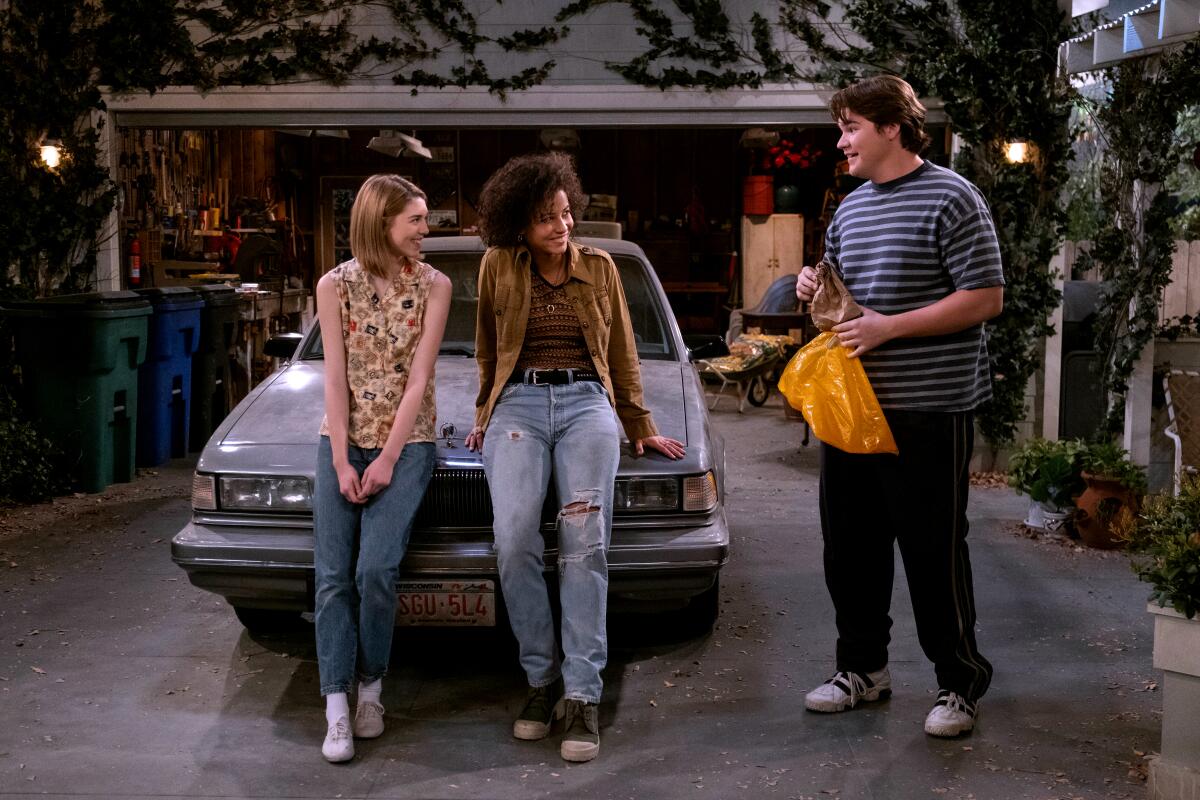
Young people, wearing the old clothes of formerly young people, are at the center of “That ‘90s Show,” which, like “That ‘70s Show,” is “Happy Days” with drugs and sex. Though the age of experimentation trends lower with time, as the clothes and hair and the mode of the music change, teenage shenanigans, awkwardness and ignorance remain fundamentally the same — which makes “That ‘90s Show” very much of a piece with its predecessor, substituting techno for disco and sneaking off to a rave for sneaking off to a rock concert. Episodes in the new and old show alike concern acquiring a tap to get beer out of a lucked-into keg. And they are still smoking pot, though, again, this is implied (the signature “circle” scenes are back) rather than shown — an aesthetic choice now, rather than a network mandate.
Although the stars of the first show (notably minus the legally embroiled Danny Masterson) are present at one point or another, apart from Debra Jo Rupp and Kurtwood Smith, they are bit players. Once again, we are in Point Place, Wis., mostly in the kitchen, driveway and basement of grumpy Red (Smith) and doting Kitty (Rupp) Forman. Son Eric (Topher Grace) and wife Donna (Laura Prepon) are visiting from Chicago with daughter Leia (Callie Haverda), named for the space princess. (Eric, still a nerd, has become a professor teaching a course in “The Religion of ‘Star Trek,’” and Donna, still tough, has written “a book,” though just what sort of book it is not thought important enough to specify.)
Attracted to the sound of Alanis Morissette’s “You Oughta Know” blasting from Donna’s old house next door, Leia meets Gwen (Ashley Aufderheide), determines that she needs to become her best friend and talks her parents into letting her spend the summer with her grandparents. In the bargain, she inherits Gwen’s crew, including her jock half-brother Nate (Maxwell Acee Donovan); her brother’s brainy girlfriend, Nikki (Sam Morelos); acerbic Ozzie (Reyn Doi) and hunky Jay (Mace Coronel), the son of on-again-off-again couple Kelso (Ashton Kutcher) and Jackie (Mila Kunis) — here getting remarried “for the second time” — who is hot and flirty and more or less the Donna to Leia’s Eric. Except for Ozzie, who is more than a third of the way through his 16-part coming-out plan, the girls are smarter than the boys.
It can feel a little strenuous. The scripts, in classic Fox style, do not spare the sex jokes, the body part jokes or the bodily function jokes. As in days of yore, “Son of a bitch” qualifies as a laugh line, as do Red’s variations on putting a foot in someone’s backside. Rupp is funny whatever she’s given to say, and though Kutcher and Kunis are in and out in a flash, the returning players seem to be having the same good time they seemed to be having the first time around. And Wilmer Valderrama, as the Fez (it stood, more or less, for “foreign exchange student”), now a star hairdresser, makes a particular meal out of his relatively substantial appearances.
We surveyed The Times TV team to come up with a list of the 75 best TV shows you can watch on Netflix. As in, tonight.
The new cast trends younger than their “’70s Show” counterparts, and taken as a whole lack their physical weight and maturity, which can give the series the flavor of a dedicated “teen sitcom”; at times, it’s like watching the best actors from half a dozen high school drama departments, which I mean in the best way.
Still, compared to Leia, whose journey from innocence to experience this is, the other young characters are underwritten; it might have something to do with this being a 10-episode series, rather than a show that logged 200 episodes over eight years, but for whatever reason, one never quite emotionally invests in their challenges, as charming as the actors are to watch. Nevertheless, Haverda has an appealing presence, and her castmates (including Andrea Anders as Gwen’s mother, the series’ other adult) have fine comic instincts. Particularly well served by the writers are Doi, the resident mordant wit, and Donovan as the doofus — in Kutcher’s old job, basically. (Nikki: “Babe, you can fit three of your basements in this basement.” Nate: “That sounds like a lot of work. … Let’s just use this basement.”)
The kids obsess over flannel. (That is as grunge as it gets.) There are references to Donkey Kong, Sheryl Crow, summer reruns, the Miata, Jay Leno, “Clerks,” the Madonna-Dennis Rodman whatever-that-was, Ricki Lake, Sassy magazine, Bill Clinton on “Arsenio,” the Menendez Brothers (Kitty: “I’m not a fan of the murders, but a big fan of the sweaters”), dial-up modems (Kitty again: “The internet is just two demons yelling at one another”; Ozzie: “That’s pretty accurate, yeah”) and “Beverly Hills 90210,” which prompts a fantasy parody and a funny cameo from Brian Austin Green.
Whether those cultural callbacks will mean anything to viewers who knew them firsthand I couldn’t say, but I can’t recall that the cultural references in the earlier version, whose characters inhabited my generational timeline, ever felt like a reason to watch “That ‘70s Show.” Kids happy to spend time with good-looking peers cutting up while dressed in their parents’ clothes may find this just their — what do they say nowadays? — jam. But to anyone interested in a sharper picture of young people in the last years of the last century, let me direct you to Freevee’s lovely “High School.” And “My So-Called Life,” actually made in the ‘90s, is streaming, in all its single-season glory, on Hulu.
Flannel is included.
‘That ’90s Show’
Where: Netflix
When: Anytime, starting Thursday
Rated: TV-14 (may be unsuitable for children under the age of 14 with advisories for substance abuse and coarse language)
'Night Court'
Where: NBC
When: 8 and 8:30 p.m. Tuesday
Streaming: Peacock, anytime starting Wednesday
Rated: TV-PG (may be unsuitable for young children)
More to Read
The complete guide to home viewing
Get Screen Gab for everything about the TV shows and streaming movies everyone’s talking about.
You may occasionally receive promotional content from the Los Angeles Times.
